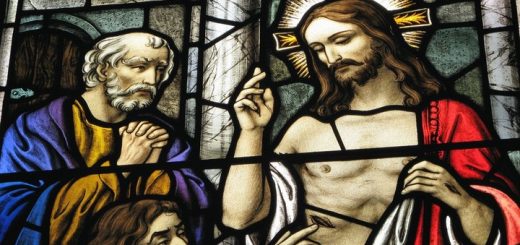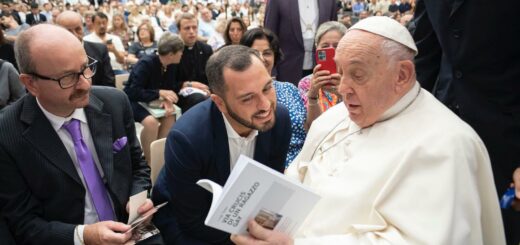The scandal of Maria Maddalena, apostle of the apostles
Theological reflections of Cynthia Garrity-Bond* published on the site Feminism and Religion (United States) On July 16, 2015, freely translated by Giacomo Tessaro
A short time ago I did one of those tests that are on Facebook, who promised to let me know what my biblical name was. With my great joy, he assigned me the name of Maria Maddalena; However, I am disappointed by the fact that his biography lack of historical certainties.
On July 22, Maria Maddalena's holiday is celebrated, which has been witness to the resurrection, and therefore appointed "Apostle of the Apostles". There are many interpretations of his figure, how many are the images that have been given. In the first centuries his popularity was greater than that of the Virgin Mary, but in the fourth century his positive image began to cloud.
In 594 Pope Gregory the Great pronounced a sermon in which he merged the figure of the unnamed woman who greases Jesus in the Gospel of Luca with that of the penitent prostitute Mary of Magdala; A title, this, which would have kept for almost 1,400 years, until 1969, when the Catholic Church declared that Mary was not actually a prostitute.
On the other hand, the most recent feminist theological research (I am referring here above all to Karen King) offers Mary's image of a community leader: "Starting from the second century, until the twenty -first, the prophetes and the preachers have always referred to her to legitimize their leadership role" Karen King says, according to which, presenting her as a prostitute and adulterous, the Church has suffocated the image of Mary as a spiritual leader. In this article I would like to deepen the dichotomy between Mary the penitent Sguadrina and Maria "Disciple of the prominent of Jesus, visionary, spiritual teacher" (King).
To begin with, I would like to ask a question: as regards his role as leader, what is the meaning of his being a former prostitute who was also (to put it with Karen King) disciple of Jesus, visionary and spiritual teacher? To get an answer, I turn to Marcella Althaus Reid and his Indecent theology, and above all to Martín Hugo Córdova Quero and his The prostites alo go Into the kingdom of God: a Queer reading of Mary of Magdala (Prostitutes also access the Kingdom of God. An interpretation of Mary of Magdala's queer). Quero wants to shed light on the dichotomies that distinguish theologies decent from those indecent:
"Normal. Correct. Honest. Holy. Orthodox ... the labels of decency.
"Abnormal. Incorrect. Dishonest. Sinner. Heterodox ... the labels of the indentation ".
Indecent and queer theologies put in crisis the normal-analyrmal dichotomy, as it constitutes a denial of the body and sexuality. According to Quero, Maria is hostage to this way of thinking, “Either he is sinful or is holy, either he is decent or he is indecent. Binary thinking does not allow alternatives ". Binary thought eliminates, from its role as leader of prominent, the element of sexuality, so that it can be co -opted as decent woman. The task of indecent and queer theologies is to question what is considered acceptable and normal, in particular when sexuality is at stake.
Such destabilization takes place when we ask ourselves if a queer Jesus is able to save humanity, or if a prostitute can be a reliable witness of the resurrection. For indecent theology and queer and feminist thought the journey of Maria Dalla indecency a decency It differs little from the classic Christian tradition imposed by men: Mary must become acceptable to traditional Christian morality. Only when his reputation will be cleaned up and his sexuality will be denied, will he be able to have his place within the correct order of moral and ecclesial leadership, and thus making "adapting" to the acceptable and necessary roles established by the heteropathotic conception on female sexuality .
Puting in the center what is considered normal, decent and orthodox reduces to silence what is seen as abnormal, indecent, heterodox, what does not conform to those artificial models. According to Quero, there is a need for a theology that is not afraid of what is indecent, but how could this theology be? To begin with, it would worry more about the security of sex workers from all over the world, and the violence they suffer, rather than the doubtful morality of their work, as it is judged by abolitionist feminists and eteropatriarchate.
Speaking of the forms of sexual intercourse outside the marriage in the Catholic Church, Christine Gudorf states that the interest in the structure of sexual ethics makes us understand that "It is the physical structure of the sexual act, and the condition of those who perform it, rather than the quality of the relationship within which the act takes place, or the reasons (or the lack of reasons) that move that relationship, or the consequences of that act on the people involved, which determine the lawfulness of the act ".
Gudorf's analysis, although not specifically dealing with prostitution, is located in my own vein of reflection on the dichotomy of the prostitute Maria Maddalena, considered either as a sinner, or as a saint. Quero supports, speaking of Mary Maddalena as a counter-icon, that Christianity must "To welcome those who, with their own gender characteristics and sexual behaviors, open a breach in normalization promoted over the centuries by classical theology".
For this reason, I suggest free Mary from those reassuring readings that make us so much uncomfortable, and that sexuality, including prostitution, is considered in its context and in a frame of relationships, and freed by the anxious moral minimalism and its own Aut-Aut. The title of prostitute/sex worker does not imply a lower moral stature, or less integrity.
Karen King writes that, when Maria Maddalena is considered a slut, her moral profile is debased, but the fact that she could really be a prostitute does not diminish her being a disciple and leader. Giving the whore certainly does not help the identity and progress of women.
I hope that this July 22 you will find the time and the way to celebrate Maria Maddalena in her various incarnations, so that it can be freed from any interpretation that diminishes her strength, her loyalty, her stature as a disciple and its moral integrity, and can be placed in a wide context of indecency.
* Cynthia Garrity-Bond is feminist theologian and expert in social ethics. His doctoral to Claremont Graduate University on women in religions is ending, a study that is intertwined with theology, ethics and culture. In the last six years he has taught the Department of Theological Studies of Loyola Marymount University (United States), where he completed his studies in theology. Its research field includes feminist sexual theology, historical theology (in particular female religious movements), the movements of resistance to ecclesiastical authority, embodied theology, Mariology and transnational feminisms. Returning recently from southern Africa, Cynthia is leading a research work on prostitution from a theological point of view.
Original text: An Indecent reading of Mary Magdalene by Cynthia Garrity-Bond






